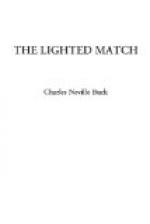“What is done, is done. Bismillah—no matter!” The Englishman curbed his annoyance and spoke as one resigned. “What now remains is this: We must see them, and you must learn to recognize them. You understand?”
The other bowed in unperturbed assent.
“All Europeans,” he suggested, “dine at the Pera Palace Hotel—it is the Mecca of their hunger.”
To the white man’s voice returned the ring of asperity. “And at the Pera Palace, we shall not only see, but be seen. Likewise unless we have a care in this enterprise, we shall not only eat, but be eaten. A man may stare at whom he chooses on Galata Bridge.”
“When I dine in a public place”—the Osmanli smiled cunningly from the depths of small pig-like eyes—“I shield myself behind a screen. Thus may I observe unobserved.”
The sun had set, but the yellow after-glow still lingered in the sky behind Stamboul as the two men stood looking toward Galata Bridge, where their quarry had escaped them, and across the Golden Horn.
A pyramid of domes, flanked by a pair of slender minarets, daintily proclaimed the Mosque Yeni-Djami against the fading amber. On Galata Bridge itself, the day-long tide of medleyed life was thinning. Where there had been an eddying current of turbans and tarbooshes, bespeaking all the tribes and styles which foregather at the meeting place of two Continents and two seas, there were now only the belated few.
To the jaded imagination of Martin Effendi and his companion, Abdul Said Bey, the falling of night over the quadruple city, smothering more than a million souls under a single blanket of blackness, made no appeal. They were watching a yacht.
Over the Pera roofs swept flocks of crows to roost in their garden rookeries at the center of the town. Across the harbor water, now too gloomy to reveal its thousands of jelly-fish, drifted the complaining cries of the loons. Then as the occasional city lamps began to twinkle, making the darkness murkier by their inadequacy, there arose from the twisting ways of Pera, Galata and Stamboul the night howling of thirty thousand dogs.
At length Martin held up the dial of his watch to the uncertain light.
“I must be off,” he announced. “Jusseret is waiting at the Pera Palace. Don’t fail us at seven-thirty.”
The tireless features of Abdul Said Bey once more shaped themselves into a deliberate smile. “Of a surety, Effendi. May your virtues ever find favor in the sight of Allah.”
For a moment the pig-like eyes followed the well-knit figure of the Englishman as it went swinging along the street. Then the Turk turned and lost himself in the darkness.
The Pera Palace Hotel stands in the European quarter of the town. To its doors your steps are guided by a trail of shop signs in English, French, German and Greek, among which appear only occasional characters in the native Arabic.




